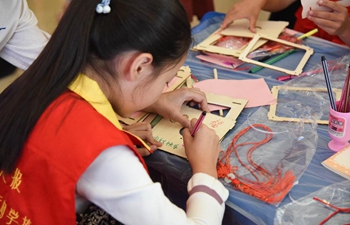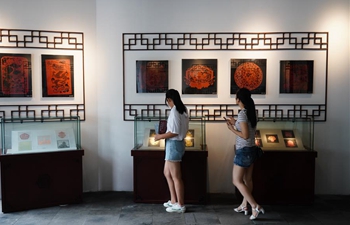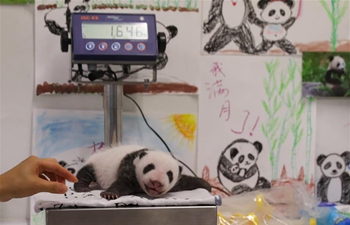by Keren Setton
JERUSALEM, Sept. 14 (Xinhua) -- The complete blood count (CBC) is perhaps the most frequently used blood test in the world, which gives the doctor an overview of a patient's health and a general direction for possible causes of certain ailments.
At present, unless taken at an emergency room or trauma center equipped with an on-site central lab, CBC results take at least a few hours, sometimes one day. They usually require a special visit to a clinic and health care is delayed.
For patients, such as children or elderly people who often have less accessible veins, a simple blood test can be a lengthy ordeal. For the people at Sight, an Israeli start-up based in Tel Aviv, the goal is to change all that.
They have created a device, a little bit larger than a desktop printer, that can analyze a few drops of blood within ten minutes. It is basically an automated microscope that uses computer analysis in order to produce CBC results rapidly.
"We thought machine vision, meaning replacing the human eye behind the microscope, could add value and in many cases do better work than human beings or the heavy equipment that is limited," said Yossi Pollak, co-founder and CEO of Sight.
It is another case in which computers are replacing human beings. Now, our blood samples are looked at by lab technicians who analyze our cells, and translate them into results for doctors to make diagnosis.
In the vision of Sight, there will be less need for lab technicians and even the clinic receptionist can take your blood sample which will be analyzed by their machine as you wait for your appointment.
Blood can be taken from your finger tip and dripped onto a cartridge that is then inserted into the machine for analysis. A small printer then spits out a piece of paper with a series of numbers -- your CBC.
Pollak claims the accuracy rate is equal to the labs working today, with clinical studies conducted in leading American hospitals. There have also been pilots in two leading Israeli medical centers.
"You don't need to compromise, and we bring the lab grade quality and accuracy to the point of care," Pollak told Xinhua.
Sight is also riding on previous international success. Its method to expedite malaria detection is being used in over 20 countries, mainly in Africa, which struggles with the disease.
Sarah Levy, CTO of Sight, said that the device, called OLO, will revolutionize health care. "Patients and doctors will have the data at the same place and time to make better decision, which result in the end in better health care," Levy said.
While currently focusing on perfecting CBC analysis by using Artificial Intelligence (AI) and machine learning, both Pollak and Levy are looking forward to more ways of utilizing their technology.
"We will have the images of the blood of all these people that will be tested which means we are building an infrastructure, a database of blood images. That's a huge data source for future applications," Levy told Xinhua.
They believe that in the future they will be able to make early diagnoses of certain types of cancers and rare diseases.
According to Levy, all samples are deidentified and the sensitive data collected is properly protected. There are diseases can be seen by the size or shape of blood cells, something OLO has quick access to.
"We can learn from every sample that is tested because there is so much information in the blood," Pollak added.
For now, Sight is waiting for FDA approval which will enable them to set up their devices in many points of care in the United States. Their goal is to set up thousands of OLO's at different sites including medical centers, doctors' offices, emergency rooms and even ambulances.

















